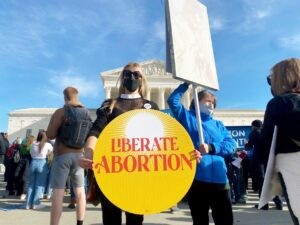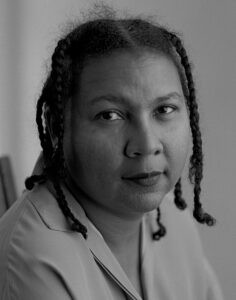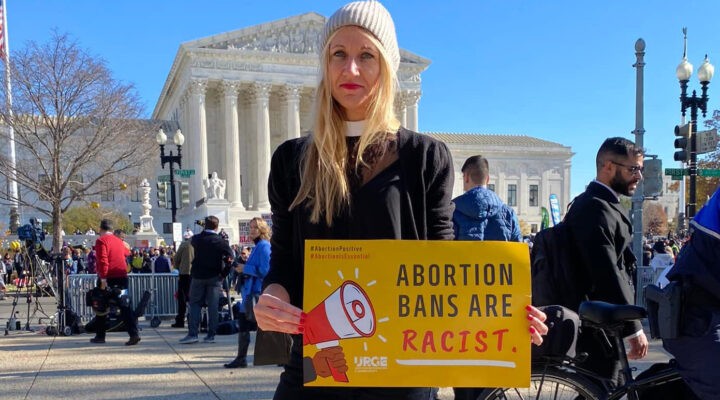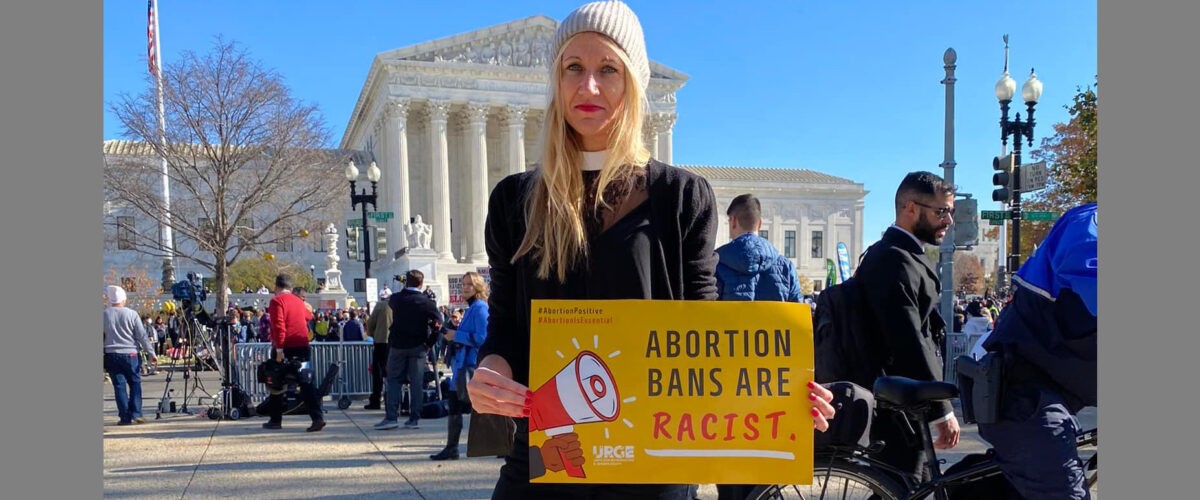On Dec. 10, the United States Supreme Court upheld Senate Bill 8, the Texas ban on abortions — not officially overturning Roe v. Wade, the court case legalizing abortion, but certainty sinking its future.
On Dec. 1, I traveled with members of our congregation to the steps of the Supreme Court to bear witness as arguments were heard to overturn Roe. For much of the day, I stood side by side with anti-choicers — people who also traveled to the steps of the Supreme Court but who came professing faith in a very different God than I profess.
 There’s a photo of me standing with my Jesus collar right beside another white woman holding a large image of Jesus with anti-choice messaging.
There’s a photo of me standing with my Jesus collar right beside another white woman holding a large image of Jesus with anti-choice messaging.
Two people. Inches apart. Both claiming Jesus. Both somehow coming to completely different understandings of how our faith informs reproductive rights.
The day before, on Nov. 30, a 15-year-old who had access to a semiautomatic handgun opened fire at a school in Michigan — where a member of our congregation went to school — killing four students and wounding many others.
Between 2009 and 2018, the U.S. experienced 57 times more school shootings than other major industrialized nations combined. And this year, there were more deaths on school grounds than any other back-to-school time on record.
This Christmas season, you’ve likely seen elected officials and their families posing with large rifles around Christmas trees, some even asking for ammunition from Santa.
“Two people. Inches apart. Both claiming Jesus. Both somehow coming to completely different understandings of how our faith informs reproductive rights.”
Two families. Only a return label apart. One holding guns smiling. One holding grief of children lost to gun violence. Both claiming Jesus. Both somehow coming to completely different understandings of how our faith informs the Second Amendment.
We would do well to stop and ask a few questions here:
- How is it that people come to completely different understandings of how our faith informs our politics? Why is it that white evangelicals are overwhelmingly anti-choice and simultaneously pro-gun?
- What — if anything — does our holy text have to say about this?
- And finally, as Dr. King would ask, where do we go from here?
Abortion and guns go together
To give some insight into the first question we need to go all the way back to 1619, but you don’t want to read that much here, so we’ll start in the 1970s.
You’ve noticed that I am using the phrases “anti-abortion” and “anti-choice” rather than “pro-life.” I’ve stopped saying “pro-life” because that phrase is such a farce. We should let it die.
We need to understand that there have been decades of coordinated attempts to control what is understood as moral and Christian in this country. New Christian Right or the Moral Majority formed by capitalizing on conservative backlash against liberal gains of the 1960s — focusing on absolute obedience to God’s laws as the solution to the moral decay. The NRA mirrored this by casting the Second Amendment as a God-given right; gun ownership offered a sense of “moral purpose to white males who have lost or have fear of losing their economic footing.”
You do know that white men today are the most likely to be gun owners and that white evangelicals are more likely than members of other faith groups or the average citizen to own a gun? I’d say they were successful.
As for the anti-choice movement, there was something else threatening — as bell hooks calls it: The imperialist-white supremacist-capitalist-patriarchy.
“We have to understand that evangelicals seized on abortion not for moral reasons but as a racially coded attack to keep schools segregated.”
We have to understand that evangelicals seized on abortion not for moral reasons but as a racially coded attack to keep schools segregated.
Bob Jones University’s loss of tax-exempt status on the grounds of racially discriminatory practices made the imperialist white supremacist capitalist patriarchy lose their you know what.
“Oh, hell no!” the white men said. “We can’t lose our power! Or control! We can’t lose the illusion of greatness that whiteness purports. What can we do? How can we organize to win?”
Unborn babies were the tool they manipulatively chose as the means to their end. Unborn babies are a lot more palatable than being openly racist.
Notably, prior to 1979, evangelicals were indifferent in the reproductive justice conversation; in fact, many were pro-abortion. A 1968 evangelical symposium refused to characterize abortion as sinful, and In 1971, Southern Baptists passed a bill to work for legislation that would allow abortions under certain conditions.
What happened next was brilliant marketing by straight white Christian men who were losing power. Gun rights and protecting unborn babies became synonymous with “morally right,” ensuring continued control of patriarchy’s puppets. And this harmful marriage continues today.
God and Jesus are intersectional
To the second question: How might our holy texts inform the issues of today?
One of the most powerful things I’ve come to understand is that Jesus and God are inherently intersectional. The Bible doesn’t use the term “intersectionality” (it was coined by Kimberle Crenshaw), but the concept of overlapping injustices was present in ancient societies, as are examples of how Jesus and God respond.
In their book Introduction to Intersectional Theology, Grace Ji-Soon Kim and Susan M. Shaw argue: “We must embrace intersectionality as a theological method to create new ways of understanding that will not only liberate the subordinate but will also liberate the dominant, the colonizer, the privileged as all join together to seek to build an equitable and just world that values and affirms all people across differences of race, ethnicity, gender, sexual identity, national origin, ability, age, religion, or socioeconomic class.”
They continue: “People who claim to love God must embrace the Gospel’s insistence on liberation and justice. Intersectionality adds that God’s bias toward justice encompasses all of the differences and oppressions simultaneously. “

“Christ and the Woman of Samaria,” Pierre Mignard, 1681.
One of the best examples of the intersectional Jesus is the woman at the well in the Gospel of John. Samaritan women were of mixed ethnicity — Jews considered them foreigners and didn’t engage with them, plus she was a woman, plus she had five husbands.
But Jesus reaches out across all of that — ethnicity, gender, class, religion — and engages her in highly intellectual religious conversation. We see God’s intersectionality in the story of Hagar, in the woman with the alabaster jar, teaching the disciples to fish … we could go on and on.
But the point is this: If we follow an intersectional Jesus, our faith must inform our politics and social views intersectionally as well.
When I was at the Supreme Court building, several young white boys thrust microphones in my face wanting to know only one thing: “When does life begin?”
To which, after several looks, I replied, “You’re asking the wrong question.”
“God approaches this conversation considering all the things, all the intersections.”
God approaches this conversation considering all the things, all the intersections: What is happening before and after and all around? Who is at the center of this conversation that shouldn’t be? Where does this conversation fall within my ultimate insistence on liberation and justice?
And friends, when we do that, we can’t not hear, can’t not see that:
- The U.S. is the only industrialized nation in the world where maternal mortality is rising and that the U.S. ranks 33 out of 36 in infant mortality.
- Infant and maternal mortality among Blacks and Latinx are more than twice the national average
- Economically poor people will suffer the most when Roe is overturned.
- Black infants in Texas are twice as likely as white infants to die before their first birthday.
- The national Black maternal mortality rate is 44 deaths per 100,000, compared to only 17.9 white deaths per 100,000.
- Senate Bill 8 will compound the long-term damage of racism in the Texas health care system.
This is how systemic racism works.
We can’t be anti-choice and profess to be Christians. If we do, we are admitting that to be Christian is to continue the legacy of white supremacy and systemic racism.
We can’t glorify guns and support the NRA and profess to be Christians. If we do, we are admitting that to be Christian is to be puppets to the patriarchy.
Intersectional theology is a destabilizing theology and, when applied, will shake a whole lot of things up. For starters, we need to develop critical self-understandings of our own intersectional identities: What privileges, advantages, social locations do I bring to the conversation? And we need to ask: Who else needs to be here?
We’ve got a lot of speaking up to do
And now, the third big question: Where do we go from here?
Recently while preparing to preach a sermon on Zephaniah 3:14-20 — where God appears to be speaking, “I will remove disaster from you; I will deal with all your oppressors; I will save the lame” — it occurred to me that the birth of Jesus isn’t a singular moment where change can happen. It is, instead, the opposite. God is all up in the midst now.
Zephaniah realizes here that he can speak on behalf of God, on behalf of love and justice and all the intersections where the enfleshed body of God lives.
“There have been forces — evil forces — in coordination speaking and organizing for decades professing a God I do not know.”
And so can we. And we’ve got a lot of speaking to do. Because there have been forces — evil forces — in coordination speaking and organizing for decades professing a God I do not know.
When we understand Jesus as inherently intersectional, our politics are so informed. And an intersectional faith ends the filibuster, liberates abortion, passes massive gun reform. An intersectional faith flows from the multiethnic person of Jesus, who is enfleshed at Christmas time.

bell hooks (Getty Images)
It was an honor of my life to develop a friendship with feminist scholar bell hooks, who died last week. I was planning on taking a trip to see her again soon, and before she died I dreamed a white young boy with a large rifle was literally standing in my way, blocking me from sitting at the feet of one who for decades has looked the imperialist white supremacist capitalist patriarchy in the eye with radical imagination, love and intellect and pressed on anyway.
I’ve been sitting with the heaviness of that dream after her death. But I remember that every time I left bell’s house, she would call to me, “Don’t forget to love!”
And I’m reminded of when abolitionist Mariame Kaba was asked, “How are we going to take care of ourselves without police?” Or “How are we going to (fill in the blank)?” She answered, “I don’t know, but we’re going to figure it out together.”
Where do we go from here? I don’t know exactly, but I know that we go together. And that we go with God. And that we must not forget to love.
Amanda Hambrick Ashcraft serves as executive minister of Middle Collegiate Church in New York City. She is a graduate of Samford University and Baptist Theological Seminary at Richmond.
Related articles:
SBC calls for ‘immediate abolition of abortion without exception or compromise’
When being ‘pro-life’ really isn’t: How I became a Democrat who opposes abortion | Analysis by Chris Conley
It’s 1984 in Texas | Opinion by Terry Austin


